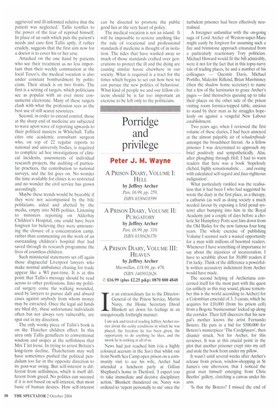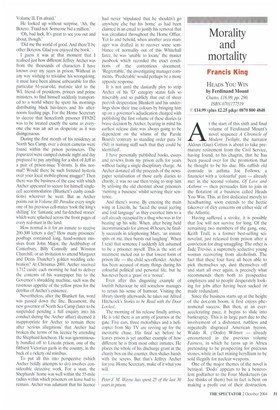Porridge and privilege
Peter J. M. Wayne
A PRISON DIARY, VOLUME I: HELL by Jeffrey Archer Pan, £6.99, pp. 259, ISBN 0330418599 A PRISON DIARY, VOLUME II: PURGATORY by Jeffrey Archer Pan, f6.99. pp. 310, ISBN 0330426370 A PRISON DIARY, VOLUME III: HEAVEN by Jeffrey Archer Macmillan, f18.99, pp. 478, ISBN 1405032626
116.99 (plus £2.25 p&p) 0870 800 4848
1 n an extraordinary fax to the DirectorGeneral of the Prison Service, Martin Narey, the Home Secretary David Blunkett set down his feelings in an unequivocally forthright manner: lam sick and tired of reading Jeffrey Archer stories about the cushy conditions in which he was placed, the freedom he has been given, the opportunity to do anything he likes, and the snook he is cocking at allot us.
News had just reached him (via a highly coloured account in the Sun) that whilst out from North Sea Camp open prison on a community visit to see his wife, Archer had attended a luncheon party at Gillian Shephard's home in Thetford. 'I expect you to take immediate and decisive disciplinary action,' Blunkett thundered on. Narey was ordered to 'report personally to me' once the
turbulent prisoner had been effectively neutralised.
A foreigner unfamiliar with the on-going saga of Lord Archer of Weston-super-Mare might easily be forgiven for assuming such a fire and brimstone approach emanated from a particularly reactionary Tory politician. Michael Howard would fit the bill admirably, were it not for the fact that in this topsy-turvy tale of trading places, he and a number of his colleagues — Quentin Davis, Michael Portillo, Malcolm Rifkind, Brian Mawhinney (then the shadow home secretary) to name but a few of the luminaries to grace Archer's pages — find themselves queuing up to take their places on the other side of the prison visiting room formica-topped table, anxious to stand by their man as he struggles hopelessly on against a vengeful New Labour establishment.
Two years ago, when I reviewed the first volume of these diaries. I had been annoyed at the almost palpable air of schadenfreude amongst the broadsheet literati. As a fellow prisoner I was determined to approach my brief positively and sympathetically. Alas, after ploughing through Hell, I had to warn readers that here was a book 'hopelessly cliched, highly sensationalistic. .. and oozing with calculated self-regard andfarvc-righteous indignation'.
What particularly rankled was the realisation that it had been I who had suggested he wrote the diary in the first place, as a therapy, a catharsis (as well as doing society a much needed favour by exposing a fetid penal system) after bumping into him in the Royal Academy just a couple of days before a choleric Sir Humphrey Potts sent him down from the Old Bailey for the now famous four long years. The whole exercise of publishing Volume I seemed such a wasted opportunity for a man with millions of besotted readers. Whenever I have something of importance to say about the injustices of incarceration, I have to scrabble about for 30.000 readers if I'm lucky. Think of the difference a powerfully written accusatory indictment from Archer would have made.
The second helping of Archeriana concerned itself for the most part with the quest (as unlikely as this may sound, please remember this is the world according to Archer) for a Colombian emerald of 3. 3 carats, which he acquires for £10,000 (from his prison cell) from a Bogota 'businessman' locked up along the corridor. Then Jeff discovers that his new pal's mother knows the artist Fernando Botero. He puts in a bid for $500,000 for Botero's masterpiece 'The Cardplayers', then disaster struck. Not for Archer, for this reviewer. It was at this crucial point in the plot that another prisoner crept into my cell and stole the book from under my pillow. It wasn't until several weeks after Archer's release from prison, window-shopping in St James's one afternoon, that I noticed the great man himself emerging from Chris Beetles' gallery, clutching a canvas under his arm.
'Is that the Botero? I missed the end of Volume II, I'm afraid.'
He looked up without surprise. `Ah, the Bolero, 'Fraid not. Someone bid a million.'
`Oh, bad luck. It's great to see you out and about, though.'
'Did me the world of good. And there'll be other Boteros. Glad you enjoyed the book.'
I guess it was at that moment that I realised just how different Jeffrey Archer was from the thousands of characters I have known over my years in prison. Without in any way wishing to trivialise his wrongdoing, it must have been almost unbearable for this particular 61-year-old, matinee idol to the WI, friend of presidents, princes and prime ministers, to find himself suddenly transported to a world where he spent his mornings distributing black bin-liners and his afternoons feeding pigs. For the Home Secretary to decree that henceforth prisoner FF8282 was to be treated exactly the same as everyone else was an act as desperate as it was disingenuous.
During the first month of his residency at North Sea Camp, over a dozen cameras were found within the prison perimeters. The paparazzi were camped outside night and day prepared to pay anything for a shot of Jeff in a pair of prison-issue Y-fronts. Is this normal? Would there be such frenzied hysteria over your local mobile-phone mugger? Then there was the business of the ease with which Archer appeared to secure for himself singlecell accommodation (Blunkett's cushy conditions) wherever he went. But as Archer points out in Volume III: Paradise every single one of his previous cell-mates 'took the king's shilling' for 'fantastic and far-fetched stories' which were splashed across the front pages of every red-mast in the land.
How normal is it for an inmate to receive 200-300 letters a day? How many prisoners' postbags contained long, hand-written missives from John Major, the Archbishop of Canterbury, Billy Connolly and Winston Churchill, or an invitation to attend Margaret and Denis Thatcher's golden wedding celebration? At Christmas 2001, Archer received 1.712 cards; each morning he had to deliver the contents of his wastepaper bin to the Governor's shredding machine, such was the ravenous appetite of the yellow press for the detritus of Archer's existence.
Nevertheless, after the Blunkett fax, word was passed down the line. Beaumont, the new governor of North Sea Camp (later to be suspended pending a full enquiry into his conduct during the Archer affair) deemed it inappropriate for Archer to remain there after 'serious allegations' that Archer had broken the terms of his licence by attending the Shephard luncheon. He was ignominiously bundled off to Lincoln prison, one of the filthiest Victorian gaols in the country, in the back of a rickety old minibus.
To put all this into perspective (which Archer boldly attempts to do) involves considerable detective work. For a start, the Shephards' home was well within the 55-mile radius within which prisoners on leave had to remain. Archer was adamant that his licence had never 'stipulated that he shouldn't go anywhere else but his home' as had been claimed in an email to justify his removal that was circulated throughout the Home Office. Yet lo and behold, when another area manager was drafted in to recover some semblance of normality out of this Whitehall farce, he was 'unable to locate' the master passbook which recorded the exact conditions of the contentious document. 'Regrettable,' the investigating manager comments. 'Predictable' would perhaps be a more apposite response.
It is not until the dastardly ploy to strip Archer of his D' category status fails so miserably and so publicly that out of sheer peevish desperation Blunkett and his underlings show their true colours by bringing him up on a governor's adjudication charged with publishing the first volume of these diaries (a brave decision by Archer, bearing in mind his earliest release date was always going to be dependent on the whims of the Parole Board) 'contrary to standing order para 34 (9d) in naming staff such that they could be identified'.
I have personally published books, essays and reviews from my prison cells for years without facing a single disciplinary charge. As Archer donated all the proceeds of the newspaper serialisation of those early diaries to charity, it was no use then trying to stop him by utilising the old chestnut about prisoners 'running a business' whilst serving their sentence.
The morning of his release finally arrives. He is told there is an army of journos at the gate. Five cars, three motorbikes and a helicopter from Sky TV are revving up for the inevitable chase. His final act before he leaves prison is yet another example of how different he is from most other inmates. He places the whole of his discharge grant in the charity box on the counter, then shakes hands with the screws. But that's Jeffrey Archer for you. Home Secretary, make of it what you will.
Peter J. IV/. Wayne has spent 25 of the last 30 years in prison.
And there's worse. By entering the main wing at Lincoln, he 'faced the usual jeering and foul language' as they escorted him to a cell already occupied by a thug who was in for beating up his wife. When, after being held incommunicado for almost 48 hours, he finally succeeds in telephoning Mary, 'an inmate spits on me, then bursts out laughing'. When I read that sentence I suddenly felt ashamed to be a prisoner myself. This is the sort of treatment meted out to that lowest form of prison life — the child sex-offender. Archer has been accused of many things during his colourful political and personal life, but he has never been a 'grass' or a 'nonce'.
Even after this disgusting example of loutish behaviour he still somehow manages to retain his sense of humour. Visiting the library shortly afterwards, he takes out Alfred Hitchcock's Stories to be Read with the Door Locked.



















































































 Previous page
Previous page